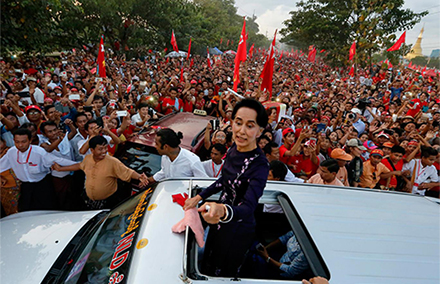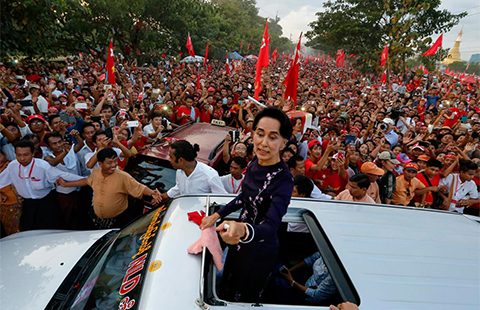
Regional organisation should welcome Myanmar’s new government and Aung San Suu Kyi.
The National League for Democracy’s dramatic victory in Myanmar’s 8 November election must represent a surprise for the Association of Southeast Asian Nations (ASEAN), the regional organisation of which Myanmar has been a member since 1997.
Ironically, the two parties do not know each other that well, and re-arranging their relationships after a new Myanmar government is installed in early 2016 may require some adjustments on the part of both. While some ASEAN governments might genuinely welcome a clear shift towards democracy in Myanmar, others have not been unduly uncomfortable with previous authoritarian regimes in Myanmar.
ASEAN’s main dealings with Myanmar have until now normally been at a government-to-government level. That of course meant the Myanmar military regime and its successor under current Myanmar President Thein Sein, not the then opposition National League for Democracy (NLD).
President Thein Sein’s government actually hosted the ASEAN Summit in 2014, performing quite creditably as chair of a multitude of ASEAN meetings at the time, including the East Asian Summit and the ASEAN Summit (both of which Australia attended). As a result, Myanmar’s technical and bureaucratic mechanisms with ASEAN are in reasonable order today, and Myanmar’s obligations as an ASEAN member represent an important element of policy continuity and ongoing political stability.
An NLD-led Myanmar government would probably have few problems with most of these largely administrative arrangements, which for Myanmar constitute formal international agreements, and remain in place despite any political changes. For their part, ASEAN governments should welcome a new Myanmar government with such unmistakeable political legitimacy, and if necessary help it find its way in regional affairs.
Historically, however, there has been surprisingly little direct interaction between ASEAN member countries and Aung San Suu Kyi and the NLD.
In 2014, for example, Suu Kyi and the NLD – largely for simple reasons of protocol – played no part in the many ASEAN events held in Myanmar. Leaders from the Philippines and Indonesia seem to have been the only high-level ASEAN visitors to Myanmar during 2014 to take the opportunity to meet Suu Kyi.
Unlike Western leaders such as then Australian Prime Minister Tony Abbott who attended high-level ASEAN meetings in Myanmar that year, ASEAN governments do not accord normally special status to an opposition leader. Before Myanmar’s political transition started after 2010, moreover, ASEAN ambassadors in Myanmar generally avoided direct meetings with Aung San Suu Kyi (when she was free) for fear of offending Myanmar’s military leadership.
Even today, few ASEAN government leaders have met Aung San Suu Kyi personally, and among ASEAN member countries, she has only visited Thailand and Singapore in 2012 and 2013 respectively. The first country Aung San Suu Kyi visited after her release from house arrest in 2010 was Thailand where the East Asian Forum was held in May 2012, when she also met Thai government leaders of the day (although they have since been deposed in a military coup) as well as thousands of Myanmar workers and refugees – mostly NLD supporters – living in Thailand.
The EAF meeting provided a perfect opportunity for government and business leaders from Europe and Asia to gain a first-hand impression of Aung San Suu Kyi. But it did not involve any in-depth discussions between Suu Kyi and regional leaders, and of course such a comprehensive NLD victory in the 2015 elections was not foreseeable at that time.
Yet Myanmar’s new government will have some important ASEAN-related commitments among its first international undertakings, led by Myanmar’s inclusion in the new ASEAN Economic Community starting up this month. ASEAN has provided some other valuable normative mechanisms that support a significant political transition such as is occurring in Myanmar at the moment.
One – at the non-government level – is the ASEAN Inter-Parliamentary Forum (AIPF), which has provided a framework for direct parliamentary exchanges, with a strong progressive agenda on human rights. Unfortunately, the AIPF never really took up this opportunity directly in Myanmar, and until the end preferred to engage in “remote-access” interaction with the (mainly democratically-elected) Myanmar parliament during 2011-15.
Another is the ASEAN Charter of human rights, a normative instrument which Myanmar has not been in a position to uphold credibly until now.
At a routine, practical level, conformity with various ASEAN technical standards substantially help small economies like Myanmar maintain effective trade and business operations while broader political and economic reforms are undertaken. In the highly competitive areas of attracting (and keeping) foreign investment, and consolidating Myanmar’s own export market openings, Myanmar cannot afford to fall behind its ASEAN neighbours again.
Myanmar’s new government under Aung San Suu Kyi would do well to reaffirm its public and unreserved commitment to all those ASEAN procedures that represent best international practice and facilitate active Myanmar participation in the Southeast Asian regional economy. While full Myanmar compliance with ASEAN normative instruments could well raise issues that an NLD-led Myanmar government might wish to look into further, many of those decisions can be taken in the period ahead.
Myanmar’s participation in defence and security-related ASEAN arrangements in recent years – such as the ASEAN Defence Ministers Meetings and the ASEAN Regional Forum – should have contributed to some extent to transparency and building mutual trust. An NLD-led government would probably find such arrangements useful for conveying its own ideas on issues covered in these forums.
Other ASEAN members would hopefully find reassurance in such Myanmar interventions in due course.
Trevor Wilson is a visiting fellow in the Department of Political at Social Change, ANU Coral Bell School of Asia Pacific Affairs.
 Facebook
Facebook  Twitter
Twitter  Soundcloud
Soundcloud  Youtube
Youtube  Rss
Rss 